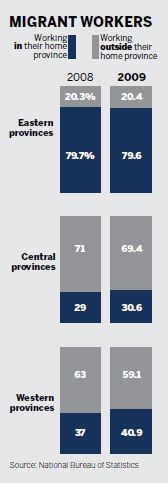Labor crunch 'structural problem'

After decades of rapid development on the back of a rich reservoir of cheap labor, many labor-intensive industries in the east have relocated to the interior because of rising labor costs. A momentum is gathering that sees migrant workers leaving cities to return to their rural hometowns.
Rising labor costs could see industry relocate and transform the growth pattern, said Yin.
Xu said that more than 12 million people would leave Hunan annually for work, but he estimated that there would be 500,000 to 800,000 fewer people leaving this year.
"If they can find a decent job near home, even if the pay is lower, they'd rather stay near their families," said Xu, adding that he welcomes companies to set up factories in Hunan as long as they "do not pollute".
Xu encouraged skilled migrant workers who have worked in cities like Guangzhou and Shenzhen to come back to start their own enterprises in the province.
The labor shortage will persist during the 12th Five-Year Plan (2011-2015) period as the economy restructures, said Cai Fang, director of the Institute of Population and Labor Economics at the Chinese Academy of Social Sciences, who is also a deputy to the ongoing National People's Congress annual session.
After decades of economic boom on the back of cheap labor and intensive energy use, China wants to make the economy more technology-dependant and boost domestic consumption.
"In the process, we need to step up vocational training for migrant workers so that they can keep up with the industrial restructuring," he added.
Yin said China still has a surplus of labor, with about 8 million people in rural areas and 24 million urban residents waiting to be employed this year, including 14 million college and high school graduates.
He also said that the aging population poses a huge challenge to the pension system.
There are 170 million people over the age of 60, 12.8 percent of the population.
"How to increase pensions has become a problem," he said.
 0
0 







Go to Forum >>0 Comments